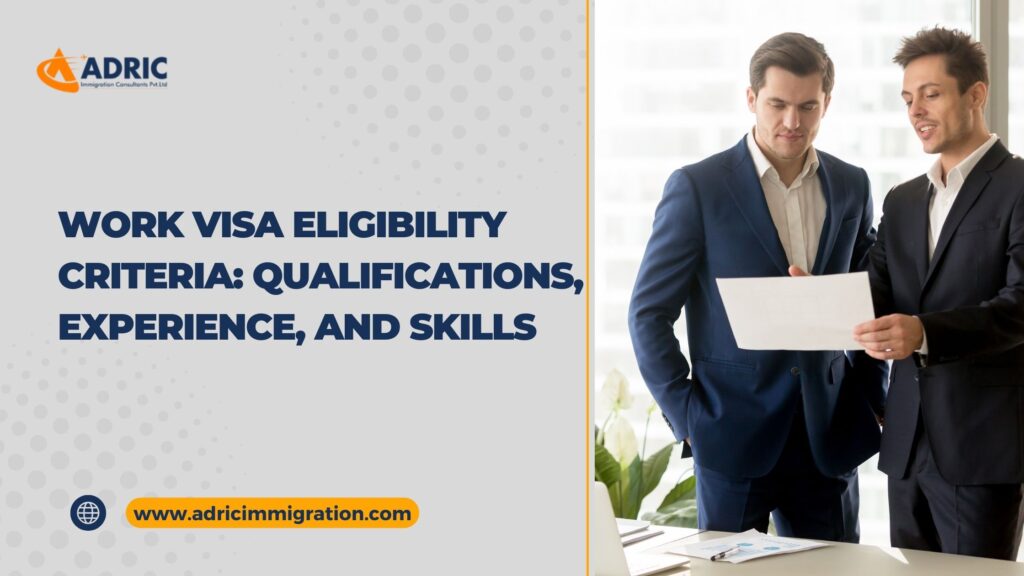Securing a work visa to pursue employment opportunities abroad is a significant milestone for individuals seeking to broaden their horizons and advance their careers. However, obtaining a work visa involves meeting specific eligibility criteria set by the immigration authorities of the host country. In this blog post, we’ll explore the essential eligibility criteria for work visas, including qualifications, experience, and skills, to help you navigate the process with confidence.
Understanding Work Visa
A work visa, also known as a work permit or employment visa, allows individuals to live and work legally in a foreign country for a specified period. Work visas are typically granted to individuals who have secured a job offer from an employer in the host country and meet the necessary eligibility requirements. Depending on the immigration policies of the host country, work visas may be issued for various types of employment, including temporary, seasonal, or permanent positions.
Qualifications
Qualifications refer to the educational credentials and professional certifications required for a specific job or occupation. The eligibility criteria for work visas often include minimum educational qualifications relevant to the job role or industry. For example, individuals applying for work visas in fields such as engineering, medicine, or information technology may be required to hold a bachelor’s degree or higher in their respective fields.
In addition to academic qualifications, some professions may require specialized certifications or licenses to practice legally in the host country. For example, healthcare professionals, including doctors, nurses, and pharmacists, may need to undergo certification exams or obtain professional licenses before they can work in their respective fields.
Experience
Work visa eligibility criteria often include minimum work experience requirements relevant to the job role or industry. Employers may prefer candidates with a demonstrated track record of professional experience and expertise in their field. The required years of experience may vary depending on the nature of the job, level of seniority, and specific skill sets required.
Individuals seeking work visas may need to provide evidence of their work experience through employment history, reference letters, or professional certifications. Demonstrating relevant work experience not only enhances your eligibility for a work visa but also strengthens your candidacy as a qualified and skilled professional in the eyes of prospective employers.
Skills
Skills play a crucial role in determining eligibility for work visas, as they directly impact an individual’s ability to perform the duties and responsibilities of the job effectively. Employers often seek candidates with specific technical skills, soft skills, and competencies that align with the requirements of the job role and industry.
Technical skills refer to the specialized knowledge and abilities required to perform specific tasks or functions within a particular field or profession. For example, software developers may need programming languages proficiency, while graphic designers may require proficiency in design software applications.
Soft skills, on the other hand, refer to interpersonal skills, communication abilities, and emotional intelligence that enable individuals to work effectively in team environments, collaborate with colleagues, and adapt to changing work dynamics. Soft skills such as leadership, problem-solving, and time management are highly valued by employers and may enhance your eligibility for a work visa.
Language Proficiency
Language proficiency is another essential criterion for work visa eligibility, particularly in countries where the primary language of communication differs from your native language. Employers may require candidates to demonstrate proficiency in the language(s) used in the workplace to ensure effective communication and collaboration with colleagues, clients, and stakeholders.
Depending on the requirements of the job role and industry, individuals may need to undergo language proficiency tests, such as the International English Language Testing System (IELTS) or the Test of English as a Foreign Language (TOEFL), to demonstrate their language skills. Achieving the minimum required scores in these tests can enhance your eligibility for a work visa and increase your competitiveness in the job market.
Conclusion
Navigating the eligibility criteria for work visas can be a complex process, requiring careful consideration of qualifications, experience, skills, and other relevant factors. At Adric Immigration, we understand the importance of meeting the necessary requirements to secure a work visa and pursue employment opportunities abroad. Whether you’re a skilled professional seeking new career prospects or an employer looking to recruit international talent, our experienced consultants are here to guide you through the process.
With our personalized approach and expertise in immigration services, we can help you assess your eligibility for a work visa, navigate the application process, and address any concerns or challenges along the way. Contact Adric Immigration today to learn more about work visa eligibility criteria and start planning your journey towards a rewarding international career opportunity.

